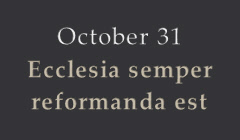The Creation Reformation
 Why should we celebrate October 31?
Why should we celebrate October 31?
For hundreds of years, people of the western world have attributed spiritual significance to the last day of October and the first day of November.
But “doctrines of demons” (1 Tim. 4:1, NKJV) governed the celebration of these days during the Dark Ages, until God brought light out of this darkness through the pen and voice of a humble monk and priest—Martin Luther.
 Read
Read
Discussion